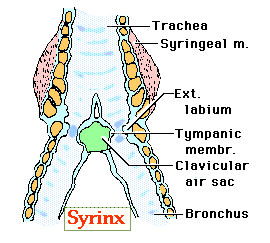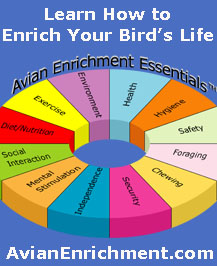How Do Parrots Talk?
|
The ability of many parrots to talk is one of the things so intriguing about these wondrous creatures. Not only can they imitate our voices and our whistles, they can also convincingly duplicate a wide variety of household sounds like the microwave beeping , the phone ringing and even the dog barking. Finely tuned senses, memory and intelligence all come into play. Parrots also have the ability to associate meaning to the words and phrases used as well as the sounds they hear. For example, many a parrot will answer “hello” when they hear the phone ring. Some people think this is just mimicry and perhaps for some birds it is. But, I think that if we use our language appropriately and put it in context for our birds then they can make meaningful associations. This responsibility lies with the teacher!
Like humans, parrots do have tongues and a throat that help to shape the sounds they produce. But can you imagine being able to produce the sound of a “b”, “m”, p” or “w” without using your lips? Or for that matter, try saying a word starting with "d", "h", "j", "k" ot "t" without your teest or palette! Another question that many people ask is “Why Do Parrots Talk?” That is simple. They are social creatures that want to be an interactive member of their human flock. Their attempts to learn our mode of communication is an attempt to get attention as well as interact with us. In fact, they seem to have a higher capacity to learn our language than we do to learn theirs. |



































































 But how do they talk and recreate sounds so accurately without the teeth, lips, palate and vocal cords that make speech possible for humans? The vocal organ that enables a parrot to make sounds is called the syrinx which is located within the bird’s breast. This vocal organ is a muscular, wishbone structure located at the base of the trachea adjacent to two bronchi (sort of like an upside down Y) where the trachea meets the lungs. Each branch of the syrinx has a moveable valve, and the valves can work independently enabling birds to produce two separate tones simultaneously. Parrots can produce different sounds by changing the depth and shape of the syrinx.
But how do they talk and recreate sounds so accurately without the teeth, lips, palate and vocal cords that make speech possible for humans? The vocal organ that enables a parrot to make sounds is called the syrinx which is located within the bird’s breast. This vocal organ is a muscular, wishbone structure located at the base of the trachea adjacent to two bronchi (sort of like an upside down Y) where the trachea meets the lungs. Each branch of the syrinx has a moveable valve, and the valves can work independently enabling birds to produce two separate tones simultaneously. Parrots can produce different sounds by changing the depth and shape of the syrinx.


